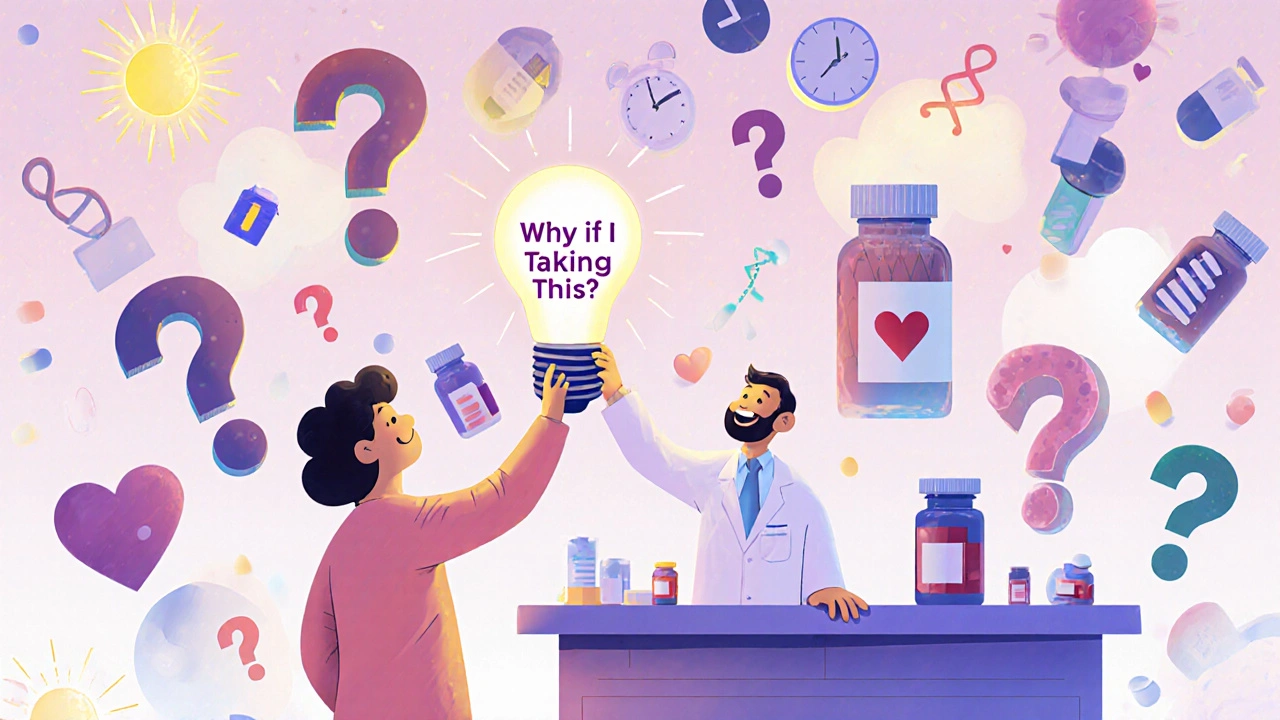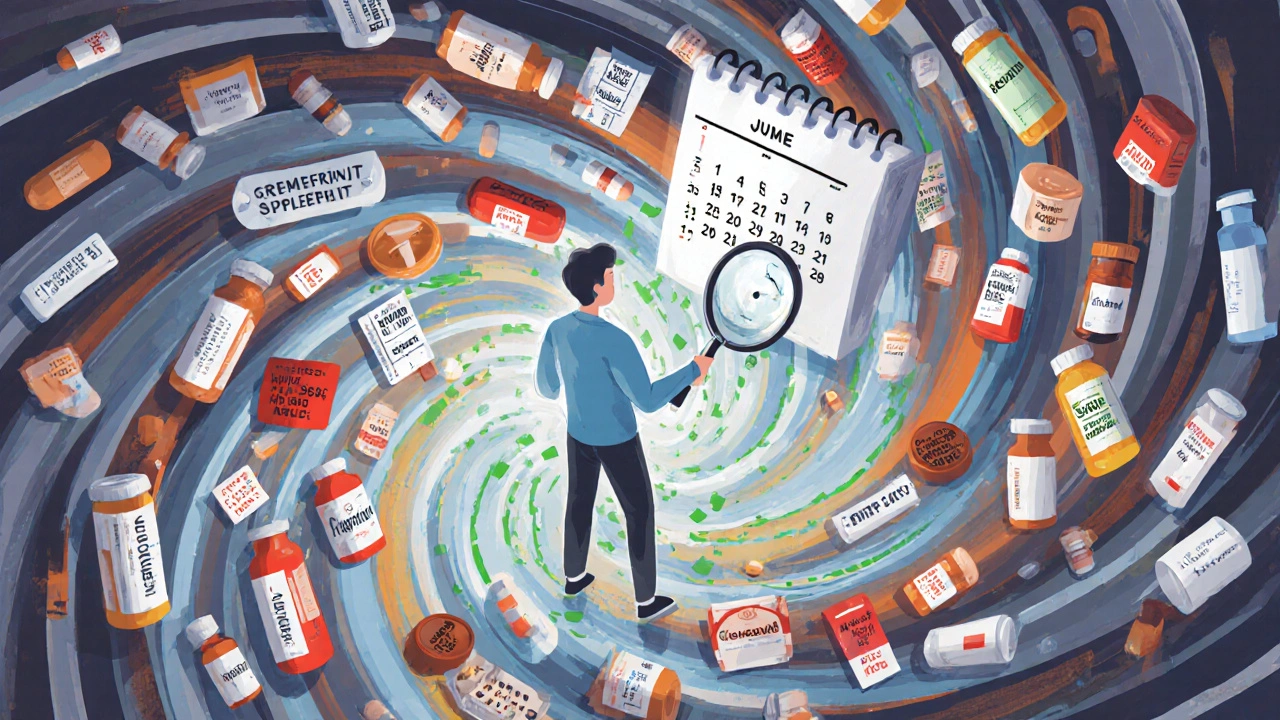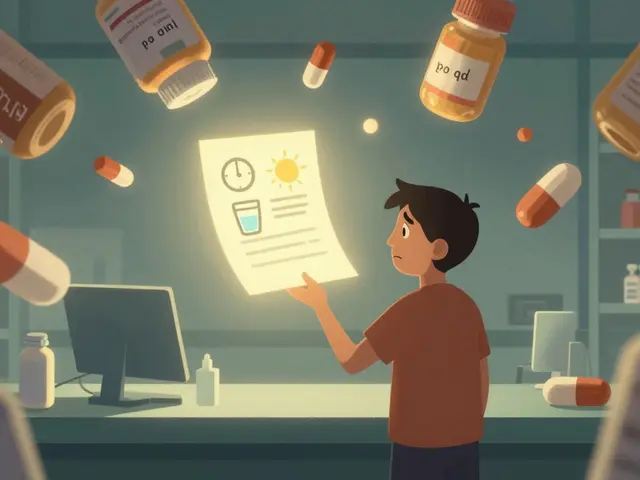
Don’t Just Take It-Ask About It
You pick up your prescription, grab the pill bottle, and head out. But did you really understand what you’re taking? Most people don’t. In fact, 30% of medication errors happen because patients don’t know why they’re taking a drug. Your pharmacist isn’t just there to hand you pills-they’re a trained expert in how medications work, how they interact, and how to make them safer for you. And you don’t need a doctor’s note to ask them questions.
What Is This Medicine For?
Start here: “What is this medication for?” Sounds simple, right? But a 2023 Brown University Health study found that nearly one in three patients couldn’t explain why they were prescribed their drug. Maybe you got it for high blood pressure, but you’re not sure if it lowers your pressure or just eases symptoms. Maybe it’s for cholesterol, but you don’t know if it’s working. Ask your pharmacist to explain the purpose in plain terms. Don’t settle for “it’s for your condition.” Ask: “How will this help me feel better or stay healthier?”
How and When Should I Take It?
Timing matters. Some pills work best on an empty stomach. Others need food to be absorbed properly. Some can’t be taken with grapefruit juice. Some make you drowsy-so taking them at night makes sense. Others need to be spaced evenly throughout the day. Ask: “Should I take this with food or without?” “What’s the best time of day?” “Can I take it with my morning coffee?”
One patient in Melbourne took their blood pressure pill at night because the label said “take once daily.” The pharmacist pointed out that the drug works best in the morning and that nighttime dosing was actually raising their morning blood pressure. A simple change fixed it.
What Side Effects Should I Watch For?
All medications have side effects. But not all are equal. Some are annoying-like dry mouth or mild nausea. Others are dangerous-like swelling, chest pain, or sudden confusion. Ask: “What are the most common side effects?” “Which ones mean I should call my doctor right away?” “Is there anything I should avoid while taking this?”
For example, some antibiotics make your skin super sensitive to the sun. If you’re planning a beach trip in December, you need to know that. Or if you’re on a statin and start having muscle pain, that could be a sign of a rare but serious reaction. Your pharmacist can tell you what’s normal and what’s a red flag.
Does This Interact With Anything Else I’m Taking?
This is one of the most important questions-and the one most people skip. You might be taking blood pressure pills, a daily aspirin, a sleep aid, and a turmeric supplement. All of those can interact. The FDA says 15% of hospital admissions are caused by drug interactions that could have been avoided. Even “natural” supplements like St. John’s Wort or hawthorn berry can interfere with prescriptions.
Bring your full list: all prescriptions, over-the-counter meds, vitamins, herbs, and even CBD oil. The pharmacist will check for interactions you didn’t know about. One Reddit user shared how asking about herbal supplements revealed a dangerous combo with their blood pressure med. Their doctor had missed it.

What If I Miss a Dose?
Life happens. You forget. You’re traveling. You’re sick. You run out. Asking “What if I miss a dose?” can prevent dangerous mistakes. Some meds need to be taken exactly on schedule. Others can be doubled up safely. Some shouldn’t be doubled at all.
For example, if you miss a birth control pill, the advice changes depending on the type and when you missed it. If you skip a diabetes pill, taking two later could cause your blood sugar to crash. Your pharmacist can give you a clear, step-by-step plan for missed doses-not just a vague “take it as soon as you remember.”
Is There a Cheaper Option?
Brand-name drugs can cost 80-85% more than generics-and they work exactly the same. The FDA requires generics to have the same active ingredients, strength, and effectiveness. Ask: “Is there a generic version?” “Can I get a 90-day supply to save money?” “Are there patient assistance programs?”
Some pharmacies offer $4 generic lists for common meds like metformin, lisinopril, or atorvastatin. Others have discount cards you can sign up for on the spot. One 72-year-old in Geelong saved $1,200 a year just by switching to generic and asking about bulk pricing.
How Will I Know If It’s Working?
How long should you wait before you notice a difference? For an antibiotic, maybe a few days. For an antidepressant, it could be 4-6 weeks. For a cholesterol pill, you might not feel anything at all-but your blood test will show results.
Ask: “When should I start feeling better?” “Will I need blood tests or other checks?” “How will my doctor know if this medicine is working?”
Studies show 68% of patients can’t answer this question. That leads to people stopping meds too soon-or keeping them too long. If you don’t know what success looks like, you won’t know if you’re on track.
Are There Other Ways to Manage This?
Medication isn’t always the only option. Ask: “Are there non-drug alternatives?” “Can lifestyle changes reduce my need for this?” “Would physical therapy, diet changes, or weight loss help?”
For example, people with early-stage type 2 diabetes often see big improvements with diet and exercise-sometimes enough to stop or reduce pills. For mild anxiety, therapy and breathing techniques can be as effective as medication. Your pharmacist can point you to resources or refer you to a dietitian or exercise program.

How Do I Remember to Take It?
Medication non-adherence costs the U.S. healthcare system $300 billion a year. In Australia, it’s just as big a problem. People forget. They get overwhelmed. They’re scared of side effects. Ask your pharmacist for practical tips: “Can you give me a pill organizer?” “Is there a phone app that reminds me?” “Should I link taking my pills to brushing my teeth or eating breakfast?”
The “teach-back” method works wonders. After the pharmacist explains something, repeat it back in your own words. If you can explain it clearly, you’re more likely to follow it. Research shows this boosts adherence by 40%.
Where Can I Find Reliable Info?
Google can give you scary, misleading, or outdated info. Ask your pharmacist: “Where can I find trustworthy, up-to-date info about this drug?”
They’ll point you to official sources like the FDA’s MedlinePlus, the Australian Therapeutic Goods Administration (TGA), or your pharmacy’s patient portal. These sites give you accurate details on dosage, warnings, and storage-not random blogs or forum posts.
How to Make the Most of Your Visit
Pharmacists are busy. In urban pharmacies, the average consultation lasts just 2.7 minutes. To get the most out of it:
- Bring a written list of everything you take: prescriptions, OTC meds, vitamins, herbs, and supplements.
- Use the FDA’s “My Medicine Record” form (available online) to organize your list.
- Go when you’re not rushed-pick up your prescription during a quiet time, like mid-morning on a weekday.
- Ask at least three questions. Studies show patients who ask three specific questions have 65% fewer medication problems.
- If you’re not sure you understood, say: “Can you explain that again?” or “Can I repeat it back to you to make sure I got it right?”
What’s Changed Recently?
Pharmacists’ roles are expanding. In 45 U.S. states and several Australian states, pharmacists can now prescribe certain medications-like naloxone for opioid overdoses, or smoking cessation aids. Some pharmacies offer blood pressure checks, flu shots, and even basic lab tests.
Telepharmacy is growing too. If you live in a rural area or have trouble getting to the pharmacy, you can now video-call a pharmacist for a consultation. And starting in January 2025, the FDA will require all prescription drug labels to follow a standard format, making it easier to read warnings and instructions.
Why This Matters
Medication errors send over 1.3 million people to U.S. emergency rooms every year. Many of these could be prevented with a simple conversation. Pharmacists prevent 27% more hospital admissions and 33% fewer ER visits when they’re involved in patient care.
They’re not just the person behind the counter. They’re your medication safety net. And you don’t need to be sick to use them. Even if you’re feeling fine, asking the right questions can keep you that way.
Can I ask my pharmacist about side effects even if I’m not having them?
Yes, absolutely. Pharmacists encourage patients to ask about potential side effects before they start a new medication. Knowing what to watch for helps you respond quickly if something happens. It’s better to be prepared than to panic later.
Do I need to bring my old prescriptions to the pharmacy?
You don’t need the bottles, but you should bring a list of all medications you’re currently taking-including doses and how often you take them. If you’re unsure, write down what you remember. Pharmacists can cross-check your list against your pharmacy’s records to spot duplicates or conflicts.
Can pharmacists change my prescription?
No, they can’t change your prescription without contacting your doctor. But they can flag issues-like a dosage that’s too high, a drug that doesn’t match your condition, or a dangerous interaction-and suggest alternatives. Most will call your doctor on your behalf if they see a problem.
Is it okay to ask about cost if I’m on a tight budget?
Yes, and you should. Pharmacists are trained to help with cost-saving options. They can suggest generics, bulk supplies, patient assistance programs, or even alternative medications that are covered under your insurance. No judgment-just practical help.
What if I’m embarrassed to ask a question?
Pharmacists hear every kind of question-no matter how personal or awkward. They’ve seen it all. Asking about sexual side effects, bowel changes, or mental health impacts is completely normal. If you’re uncomfortable, say: “I’m not sure if this is silly, but…” They’ll reassure you and answer honestly.


12 Comments
Had no idea pharmacists could flag dangerous interactions between supplements and prescriptions. I was taking turmeric with my blood thinner and never thought twice. Turns out it was raising my INR. Pharmacist caught it during a refill. Saved me a trip to the ER.
/p>lol so now we gotta interrogate the guy behind the counter like he’s a doctor? next they’ll make us fill out a form before we can get tylenol
/p>It is truly commendable that pharmacists are increasingly recognized as vital members of the healthcare team. Their clinical expertise, particularly in polypharmacy management, is underutilized in many regions. I encourage all patients to approach their pharmacist with the same level of respect and curiosity as they would their physician.
/p>My pharmacist gave me a free pill organizer and a printable schedule when I started my new antidepressant. She even called my doctor when she saw a possible interaction with my OTC sleep aid. People don’t realize how much they do. You don’t need to be sick to use them - just smart.
/p>They’re making us dependent on Big Pharma and then pretending the pharmacist is our savior. Did you know most of these ‘drug interaction’ warnings are just liability padding? The real issue is that doctors get paid to prescribe, not to educate. The FDA’s new label rules? Just PR. They’re not changing anything fundamental.
/p>I used to think pharmacists just handed out pills but then I asked why my blood pressure med made me cough and they said oh that’s the ACE inhibitor class and here’s a beta blocker alternative that doesn’t do that and now I don’t cough and I feel better/p>
Just started asking questions and wow. I’ve been taking my statin at night for years. Pharmacist said morning’s better for me. Changed it. My LDL dropped 18 points in 3 months. Why didn’t anyone tell me this before
/p>My mom’s in her 70s and she refuses to ask anything. Says ‘the doctor knows best.’ I showed her this post. She went in last week and asked three questions. Came home with a generic switch, a free sample of a better pain med, and a referral to a dietitian. She’s now the one telling everyone to ask.
/p>It is entirely inappropriate that unlicensed personnel are being positioned as primary sources of medical guidance. This is a dangerous erosion of professional boundaries. One must consult a licensed physician for therapeutic decisions - not a retail clerk with a pharmacy degree.
/p>✅ Always ask about generics
/p>✅ Always ask about interactions
✅ Always ask what to do if you miss a dose
✅ Always ask if there’s a cheaper way
✅ Always ask how you’ll know it’s working
✅ Always ask if there’s a non-drug option
✅ Always repeat it back to them
✅ Always bring your list
✅ Always go at a quiet time
✅ Always say ‘I’m not sure if this is silly but…’
✅ Always remember - they’re your safety net 🛡️
My pharmacist gave me a coupon for my insulin that cut my monthly cost from $400 to $35. I didn’t even know that was a thing. I just asked if there was a cheaper option. He said ‘oh yeah, we’ve got a program.’ I felt dumb for not asking sooner.
/p>Pharmacists are just corporate pawns. They push generics because they make more profit. They don’t care if you feel better - they care if you keep coming back. Don’t trust them. Trust your gut.
/p>